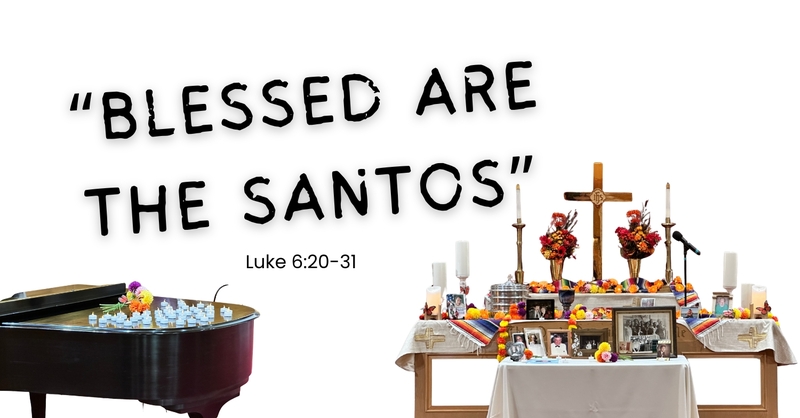
Sermon Summary
Today, we gathered in the warmth of community, surrounded by memories, photographs, and the gentle glow of candles, to honor All Saints Day—a day that is known by many names and celebrated in many ways, but always with the purpose of remembering those who have gone before us. This is not just a day for the canonized saints of history, but for all the holy ones who have carried love and faith into our lives: our ancestors, our abuelas, our friends, and all who have shaped us. In our tradition, sainthood is not reserved for a select few; it is a calling for all of us, a recognition that we are all striving to do good and to bring more light into the world.
We reflected on the origins of this day, tracing its roots back to indigenous traditions, particularly the Mexica people of Mexico, who honored death as a sacred part of life. Colonization brought changes, blending and sometimes erasing these traditions, but the heart of remembrance endures. Many of us have experienced the loss of cultural practices, sometimes feeling pressure to conform and leave behind parts of our identity. Yet, as adults, we have the right—and the responsibility—to reclaim and celebrate these traditions, to honor the color and light our loved ones brought into our lives.
The colors on our altar are not just for beauty; they represent the vibrancy and joy our loved ones shared with us. Their light still burns in our memories, refusing to be extinguished. This is the essence of Dia de los Muertos: to keep the light of our ancestors alive, blending old and new, faith and culture, resistance and hope.
We also turned to the words of Jesus, who blesses not the powerful or the comfortable, but those the world often forgets—the poor, the hungry, the grieving, the merciful. These are the true saints, the ones who keep showing up for each other, who build hope in overlooked places, who love when it would be easier to hate, who forgive when it would be easier to hold a grudge. Sainthood is not about perfection, but about faithfulness and love in the face of struggle.
As we light our candles and whisper the names of those we remember, we join a great communion that transcends time and space. Our saints are not gone; they are within and among us. May we live so that, when our names are whispered in prayer, it will be said of us: blessed are the santos, because they loved, they gave, they forgave, and they lived as if God’s kingdom was already here.
Key Takeaways
- 1. Sainthood is for all, not just a few Sainthood is not reserved for those who have performed miracles or achieved moral perfection. It is a calling for each of us to strive for goodness, to bring light and love into the world, and to live faithfully in our daily lives. Our tradition recognizes the holiness in ordinary people who choose to love, give, and forgive, even when it is difficult. [01:24]
- 2. Remembering ancestors reclaims lost identity Honoring our ancestors and cultural traditions is a way of reclaiming parts of ourselves that may have been lost through assimilation or colonization. By remembering and celebrating those who came before us, we restore the richness and color they brought to our lives, and we resist the erasure of our unique stories and identities. [06:28]
- 3. True blessedness is found in struggle Jesus blesses those who are poor, hungry, grieving, and merciful—not the powerful or comfortable. This flips the world’s values upside down, reminding us that God’s kingdom is found among those who persist in love and hope amid hardship. Our saints are those who keep showing up, building hope where it is most needed. [09:34]
- 4. Love and mercy define the saints The saints are not flawless, but faithful. They choose to love when it would be easier to hate, to give when it would be safer to hoard, and to forgive when it would be more satisfying to seek revenge. This kind of love is what unites us with the communion of saints, both living and departed. [11:38]
- 5. The communion of saints is ever-present When we light candles, set photos on the altar, or whisper “presente,” we are not calling the dead back, but acknowledging that they never truly left. The saints are within and among us, their light still burning in our hearts and memories, urging us to live as if God’s kingdom is already here. [13:13]
YouTube Chapters
- [00:00] - Welcome
- [00:40] - Gathering in Memory and Prayer
- [01:24] - The Meaning of All Saints Day
- [01:59] - All Saints vs. All Souls
- [02:23] - Indigenous Roots of Remembrance
- [02:56] - The Mexican Origin of Dia de los Muertos
- [03:27] - Colonization and Blending of Traditions
- [04:07] - Pagan Influences in Christian Holidays
- [05:28] - Loss and Reclaiming of Cultural Identity
- [06:51] - Creating Space for Remembrance
- [07:40] - The Light of Our Loved Ones
- [08:04] - Blending Faith and Culture
- [09:34] - Jesus’ Blessings and Present Reality
- [11:10] - Saints in Everyday Life
- [12:47] - Communion of Saints: Living and Dead
- [13:26] - Living the Beatitudes Today
- [14:18] - Remembering and Becoming Saints

